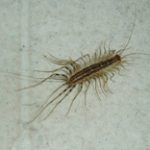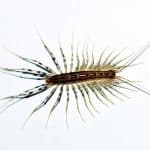The scutigère can reach 3 cm length.its body is of rather clear color, of beige with yellow gray, often marked of three stripes along the darker back.its belly is more clear.
Latin Name: Chilopoda
Description:Real name: the scutigere.The scutigere can grow up to 3 cm long.Its body is rather light in hue, from beige to yellow-gray,often marked with three stripes along the darker back.Its belly is lighter.
Reproduction:When they breed, the male and female touch their antennaeand move in a circle. During his dance, the male centipede deposits his sperm in a pocket called spermatophore, and the female collects it to fertilize.The eggs are scattered on the ground, individually all over the ground and the female lays from 130 to 290 depending on its size.At birth, centipedes have only very small legs,they will grow with the individual during six molts. When its legs have reached their full length, the centipede will have four more moults to reach its full size and sexual maturity.In nature the centipede lays eggs in the summer and spends the winter in the adult stage, but in homes its cycle may vary.
Habits:In Quebec, the centipede lives in homes, in warm and humid places, in the basement or in bathrooms.They live in the structure of buildings, in the walls on the plumbing, in the vents etc. The insect is often seen in baths, sinks or near drains.The centipede is carnivorous. It hunts other insects such as flies,silverfish,cockroaches or sowbugs.As the centipede shuns light,it hunts rather at night and hides during the day.
Prevention:As the centipede is useful because it hunts other insects,it is suggested to tolerate its presence and avoid killing it. It is rarely found in large numbers in a home.In addition, this centipede does not transmit disease to humans or animals and it does not transmit any disease to humans or pets. They can sometimes be frightening, so rather than kill them, take a wide mouth jar, catch them and put them outside. Finally, treatments can be applied but should be administered by specialists to ensure that all sources of infestation are treated.



